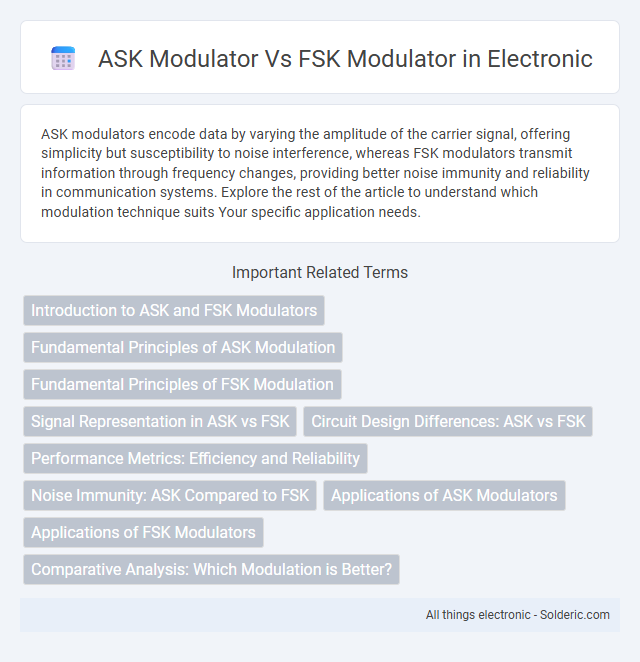ASK modulators encode data by varying the amplitude of the carrier signal, offering simplicity but susceptibility to noise interference, whereas FSK modulators transmit information through frequency changes, providing better noise immunity and reliability in communication systems. Explore the rest of the article to understand which modulation technique suits Your specific application needs.
Comparison Table
| Feature | ASK Modulator | FSK Modulator |
|---|---|---|
| Modulation Type | Amplitude Shift Keying (ASK) | Frequency Shift Keying (FSK) |
| Signal Variation | Amplitude varies, frequency constant | Frequency varies, amplitude constant |
| Noise Immunity | Low, sensitive to amplitude noise | High, better noise resistance |
| Power Efficiency | Lower, power varies with amplitude | Higher, constant amplitude signal |
| Complexity | Simple, easier to implement | Moderate, requires frequency control |
| Bandwidth Usage | Narrower bandwidth | Wider bandwidth |
| Typical Applications | Low-speed data transmission, optical communications | Radio transmission, telemetry, modems |
Introduction to ASK and FSK Modulators
ASK modulators vary the amplitude of a carrier signal to transmit data, making them suitable for simple, low-bandwidth communication systems. FSK modulators change the frequency of the carrier wave to represent digital information, providing better noise immunity and reliability in noisy environments. Your choice between ASK and FSK modulators depends on the application's requirements for complexity, data rate, and resistance to interference.
Fundamental Principles of ASK Modulation
ASK modulation relies on varying the amplitude of the carrier signal to represent binary data, where the presence of a carrier wave denotes a binary 1 and its absence denotes a binary 0. This amplitude variation directly controls the signal's power, making ASK sensitive to noise and requiring precise amplitude detection at the receiver. Unlike FSK, which varies frequency, ASK's fundamental principle centers on amplitude changes to encode information efficiently in digital communication systems.
Fundamental Principles of FSK Modulation
FSK modulation operates by varying the frequency of the carrier signal to represent digital data, assigning distinct frequencies for binary '0' and '1', which enhances noise immunity compared to ASK modulation that alters amplitude. This frequency deviation in FSK provides robustness against signal amplitude variations, making it highly effective for wireless communication systems. Your choice between ASK and FSK modulators should consider the environment's susceptibility to noise and the need for reliable data transmission.
Signal Representation in ASK vs FSK
ASK modulator represents data by varying the amplitude of a carrier signal, where binary '1' is signaled by a high amplitude and binary '0' by zero or low amplitude, leading to straightforward signal representation. FSK modulator conveys information through discrete frequencies, alternating between two frequencies for binary '1' and '0', resulting in constant amplitude signals with frequency shifts. The distinct modulation approaches influence bandwidth efficiency and susceptibility to noise, with ASK being simpler but less resilient than the frequency-based FSK method.
Circuit Design Differences: ASK vs FSK
ASK modulators use simple on-off keying circuits where the amplitude of the carrier signal is toggled between zero and a fixed level, resulting in straightforward transistor switching configurations. FSK modulators require more complex circuit designs involving frequency generators or voltage-controlled oscillators (VCOs) to switch the carrier frequency between two distinct values, demanding additional components like phase-locked loops (PLLs). Your choice between ASK and FSK modulators significantly impacts circuit complexity, power consumption, and noise immunity due to these fundamental design differences.
Performance Metrics: Efficiency and Reliability
ASK modulators generally exhibit lower spectral efficiency compared to FSK modulators due to their susceptibility to amplitude noise and fading, impacting overall signal reliability in noisy environments. FSK modulators offer greater robustness against signal degradation by maintaining constant amplitude, which enhances bit error rate (BER) performance and ensures more reliable data transmission. Efficiency in FSK systems is reflected in their ability to sustain communication with minimal power while mitigating interference, making them suitable for applications demanding high reliability over variable channels.
Noise Immunity: ASK Compared to FSK
FSK modulators exhibit superior noise immunity compared to ASK modulators due to their frequency variation method, which is less susceptible to amplitude fluctuations caused by noise. ASK modulation relies on amplitude changes, making it vulnerable to signal degradation and errors in noisy environments. Consequently, FSK is preferred in communication systems requiring higher reliability and resistance to interference.
Applications of ASK Modulators
ASK modulators are widely used in optical fiber communication and low-frequency radio transmissions due to their simplicity and cost-effectiveness. They excel in environments requiring minimal bandwidth, such as in remote control systems, RFID tags, and digital data transmission over short distances. Compared to FSK modulators, ASK modulators are preferred when signal power efficiency and ease of implementation are critical.
Applications of FSK Modulators
FSK modulators are widely used in wireless communication systems, including radio telemetry, caller ID, and low-frequency data transmission where noise immunity and signal stability are critical. Unlike ASK modulators, which are more susceptible to amplitude noise, FSK modulators provide robust performance in digital transmission over telephone lines and RF channels. Applications extend to RFID systems, Bluetooth communication, and remote control devices due to their efficient frequency-shift keying technique enabling reliable data encoding.
Comparative Analysis: Which Modulation is Better?
ASK modulators offer simpler implementation and lower bandwidth requirements, making them suitable for short-distance communication with minimal noise interference, while FSK modulators provide enhanced noise immunity and better performance in environments with signal distortion. Your choice depends on the application context; FSK is generally better for reliable data transmission in noisy channels, whereas ASK is preferred for cost-sensitive and power-efficient systems. Evaluating factors like data rate, signal robustness, and hardware complexity helps determine which modulation technique aligns best with your communication needs.
ASK modulator vs FSK modulator Infographic

 solderic.com
solderic.com